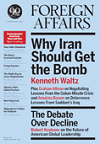When the United Progressive Alliance, a group of center-left parties led by the Indian National Congress, came to power for a second term in 2009, it seemed that India could do no wrong. The economy had sailed through the worst of the global economic recession with GDP growing at a fast seven percent annually and accelerating (it reached 10.4 percent in 2010). Inflation was low, officials were finally starting to take India’s social problems seriously, and politics in the world’s largest democracy were contentious but robust. The rest of the world was even looking to the country as a serious global power. “India is not simply emerging,” U.S. President Barack Obama told the Indian parliament in November 2010; “India has emerged.”
Just two years later, however, India’s growth is slackening, its national deficit is growing, and inflation is rising after having fallen between early 2010 and early 2012. Plans to build a more inclusive nation are in disarray. Income inequality has risen. According to the economists Laveesh Bhandari and Suryakant Yadav, the urban Gini coefficient (a measure of inequality, with zero indicating absolute equality and one indicating absolute inequality) went from 0.35 in 2005 to 0.65 today. And access to basic services, such as water, health care, and sanitation, remains woefully inadequate. Meanwhile, the country’s democracy putters along, but in the absence of leadership, policymaking has ground to a halt. India seems to have gone from a near-sure thing to, as the financial analyst Ruchir Sharma put it in Breakout Nations, a 50-50 bet.
This article was originally published by Foreign Affairs. You can read the rest of the article here.
You can read exclusive content from Gateway House: Indian Council on Global Relations, here.
Copyright © 2012 by the Council on Foreign Relations, Inc


